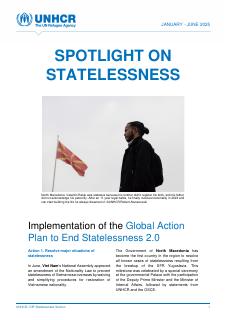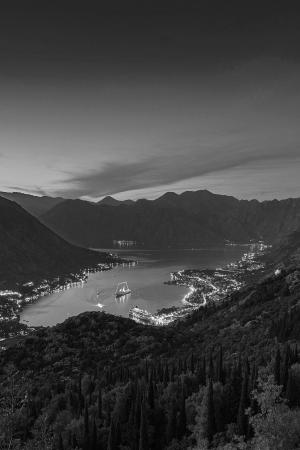“I do not know how I perceive myself. I have fear. It is deep inside of me. It is because I cannot live as others; I cannot find a proper job; I do not know if anyone will hire me after I graduate. They will for sure ask for documents, which I will not have”.
KEY ISSUES
- Statelessness and the risk of statelessness mainly affects members of the Roma community in Montenegro, who were disproportionality impacted by difficulties acquiring or establishing nationality in the context of the fall of the Yugoslavian republic in the 1990s.
- Several hundred people are reported to be affected by (risk of) statelessness in Montenegro, but this is likely to be an underrepresentation of the scale of the issue.
- Complex bureaucratic barriers, as well as discrimination, continue to impact access to birth registration and identity documents for some members of the Roma and Egyptian communities in Montenegro.
- The citizenship law of Montenegro contains safeguards to prevent childhood statelessness, but there is no information about how these are operating in practice.
- Montenegro is a state party to both Statelessness Conventions and introduced a statelessness determination procedure 2018. The procedure has a number of shortcomings – including requiring a person who is recognised as stateless to meet further stringent conditions in order to obtain a residence permit.
STATELESSNESS IN MONTENEGRO
The majority of stateless people in Montenegro belong to the Roma community, who were disproportionality impacted by difficulties acquiring or establishing nationality in the context of the fall of the Yugoslavian republic in the 1990s, the subsequent forced displacement from Kosovo in 1999, and changes in the determination of citizenship and the destruction of civil registers during the Kosovan conflict. Other minority groups at risk of statelessness in Montenegro include ethnic Egyptians.
The last population census in Montenegro was carried out in 2011 and recorded 4,312 individuals with ‘no nationality’ at that time, of which three quarters were born in Montenegro. In November 2017, UNHCR, the Ministry of Interior and the Ministry of Labour and Social Work, carried out a joint exercise to map refugees from the Former Yugoslavia in Montenegro, which covered 2,318 people. The mapping confirmed that lack of documentation remained widespread, especially among Roma and Egyptian communities, and identified at least 450 people at risk of statelessness. Based on this data and subsequent information about newly identified cases of statelessness, as well as cases that have been resolved through acquisition of nationality, UNHCR reported that there were 406 stateless people in Montenegro at the end of 2023. However, the 2017 field verification did not take into account members of the Roma population born in Montenegro who do not have regulated legal status and have been returned under a readmission agreement, and internally displaced persons from Serbia and Kosovo. As such, statelessness is considered to be underreported in Montenegro.
As a follow-up to the 2019 Poznan Declaration on Roma integration in the EU Enlargement Process, Montenegro joined other Western Balkan countries in committing to ensuring universal civil registration and ending Roma statelessness and has since reaffirmed these commitments. In 2021, Montenegro adopted a Strategy for Social Inclusion of Roma and Egyptians 2021-2025 which includes the objective to “improve the position of Roma and Egyptian communities by resolving the issue of civil status and personal ownership documents”. It also adopted a Strategy on Migration and Reintegration of Returnees in Montenegro 2021-2025 which includes the goal to “resolve the legal status” of internally displaced persons (IDPs), people who are not registered, and people at risk of statelessness. The accompanying Action Plan includes actions to tackle antigypsyism and to address civil registration and statelessness issues.
Montenegro is a state party to both Statelessness Conventions and introduced a statelessness determination procedure (SDP) in February 2018, through the ‘Law on Foreigners’. However, the number of cases that have been processed remains low and the procedure exhibits a number of shortcomings. These include that the definition of a stateless person under the law of Montenegro is narrower than the 1954 Convention definition, there are inadequate procedural guarantees, the rights of applicants during the procedure are limited (no right to work or assistance to meet basic needs) and access to a residence permit following recognition as a stateless person is subject to them meeting further stringent conditions. The right to work, education and healthcare is not guaranteed to all stateless people in Montenegro and depends on the type of residence permit issued. Those who hold a temporary residence permit can work if they also hold a work permit or work registration certificate, but the right to work for those who only hold a travel document is unclear. Children can access education up to the age of 15 but will not be granted a school certificate if they do not hold a birth certificate. Stateless people with a residence permit have access to higher education, social security, health insurance, and emergency healthcare, although they may encounter bureaucratic difficulties and be required to pay for some medical care.
THE RIGHT TO NATIONALITY IN MONTENEGRO
The rules for attribution of nationality are set down in the Montenegrin Citizenship Law. Access to nationality at birth is mainly based on jus sanguinis (by descent). To prevent statelessness, Article 7 of the law provides for automatic acquisition of nationality by a child born or found on the territory of Montenegro if they have unknown parentage, their parents have unknown nationality or are stateless, or if the child would otherwise remain stateless. However, it is not known whether this provision has been used in practice and if any child has acquired nationality based on the provision. For foundlings, the law explicitly states that nationality cannot later be withdrawn if this would lead to statelessness. There are also safeguards in the law to prevent statelessness arising during adoption procedures, as well as for children born to Montenegrin parents abroad (Articles 5-6).
The citizenship law provides for access to naturalisation following a period of 10 years of “lawful and uninterrupted residence” in Montenegro. This period is the same for stateless people who seek to naturalise, although there is an exemption from certain other naturalisation conditions for stateless people (income and language requirements).
Deprivation of nationality is permitted under the law law (Article 19-25). There are safeguards to prevent statelessness in all cases of deprivation, loss, or renunciation of Montenegrin citizenship. Provisions on deprivation of nationality apply only to dual nationals and as a result Montenegrin citizens with dual nationality have a less secure status than those who only hold Montenegrin citizenship. In all cases, there is a safeguard to prevent derivative loss of nationality (i.e. deprivation of nationality is not extended to the person’s dependents).
CHALLENGES ACCESSING BIRTH REGISTRATION FOR ROMA AND EGYPTIAN COMMUNITIES
Lack of access to birth registration is a leading cause of statelessness and risk of statelessness in Montenegro. Birth registration is protected by law and citizenship should be recorded on the birth certificate; however, there are issues in practice. Complex bureaucratic barriers to birth registration, when combined with antigypsyism and discrimination, have a disproportionate impact on access to birth registration for Roma and Egyptian communities in Montenegro, as evidenced by lower overall registration rates among these populations.
Parents must initiate the recording of citizenship in the national registry and there are cases of citizenship being wrongly attributed. Although the law specifies that births can be registered even if the identity of parents is unknown or unconfirmed by documents, in practice this is not always the case. Moreover, there is generally a lack of training for public officials on antigypsyism and specific issues faced by Roma and Egyptian communities, as well as a prevalence of stereotypical attitudes and distrust, which further hinder equal access to birth registration. Lack of documentation and/or statelessness within the Roma and Egyptian community is in many cases being passed on from parents to their children, creating intergenerational exclusion and perpetuating the risk of statelessness.
While the birth registration process has improved in recent years, the procedure to register births is diverse and complex among both the Roma and Egyptian communities. Very often, parents who do not have documentation must travel to Kosovo to register a child as a citizen of Kosovo, following which they can return to Montenegro. The procedure is costly and complicated, with burdensome evidentiary requirements.
MONTENEGRO’S INTERNATIONAL COMMITMENTS
Montenegro became a state party to the 1954 Convention Relating to the Status of Stateless Persons in 2006 and the 1961 Convention on the Reduction of Statelessness in 2013, acceding to both without making any reservations. Montenegro has acceded to the ICCPR, ICESCR, CRC, CERD, CEDAW, CAT and CRPD, for which it maintains no reservations against the provisions relating to nationality.
For more information on regional standards and intergovernmental commitments in Europe, see the StatelessHub Europe page.
- Click here to see what Recommendations Montenegro has received through the Universal Periodic Review.
- Click here to see what Recommendations Montenegro has issued through the Universal Periodic Review.
- Click here to see what voluntary pledges have been made by Montenegro.
[Last updated, December 2023]
Cover photo by Dragisa Braunovic
VOICES & EXPERIENCES
-
Statelessness, Discrimination and Marginalisation of Roma in the Western Balkans and Ukraine
![Montenegro]()
Statelessness, Discrimination and Marginalisation of Roma in the Western Balkans and Ukraine
![Montenegro]()
"I do not know how I perceive myself. I have fear. It is deep inside of me. It is because I cannot live as others; I cannot find a proper job; I do not know if anyone will hire me after I graduate. They will for sure ask for documents, which I will not have. I do not want to stay without anything in my life"
Romani woman
Statelessness disproportionately affects Montenegro's Roma community due to challenges in acquiring nationality after the fall of the Yugoslavian republic in the 1990s. While several hundred individuals are reported to face statelessness, this likely underrepresents the problem's scope. Complex bureaucratic hurdles and discrimination hinder birth registration and access to identity documents for Roma and Egyptian community members. Montenegro's citizenship law includes measures to prevent childhood statelessness, but their practical implementation remains unclear.
Voice from https://www.statelessness.eu/sites/www.statelessness.eu/files/attachments/resources/roma-belong.pdf
-
Stateless Roma and Egyptian Facing Discrimination Towards Employment in Montenegro
![Montenegro 2]()
Stateless Roma and Egyptian Facing Discrimination Towards Employment in Montenegro
![Montenegro 2]()
“We have excellent craftsmen, but they are usually unemployed, as nobody wants to hire them. We have excellent drivers, but the situation is the same as with the craftsmen. We even have college-educated people among Roma and Egyptians, but they can’t work in their field of work. Still, we are hoping that situation will change in the positive way.”
Roma Association
Voice from https://www.statelessness.eu/sites/www.statelessness.eu/files/attachments/resources/roma-belong.pdf
(page 44)
-
9th Anniversary of the #IBelong Campaign. Leave no one behind.
![Montenegro 3]()
Latest Resources: Montenegro
-

Spotlight on Statelessness January-June 2025
Type of Resource: Report
Theme: General / Other
Region: Global / Other
View -

Key Considerations For The Prevention And Reduction Of Statelessness Among Roma In The Western Balkans: Regional Challenges And Action Areas
Type of Resource: Briefing / Policy paper
Theme: General / Other
Region: Europe
View -

Ending Statelessness in South Eastern Europe #IBelong
Type of Resource: Report
Theme: General / Other
Region: Europe
View



